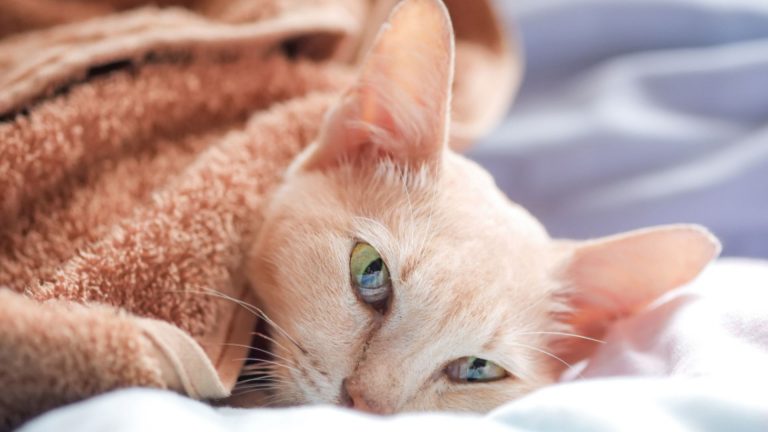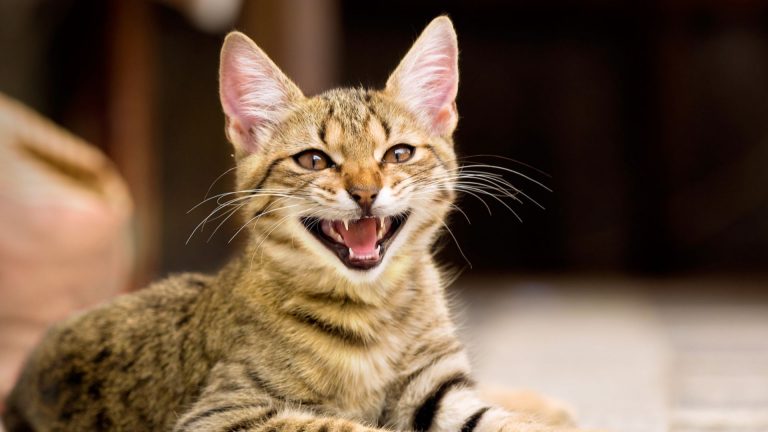Cat Hair Loss On Ears – Should You Visit The Vet?
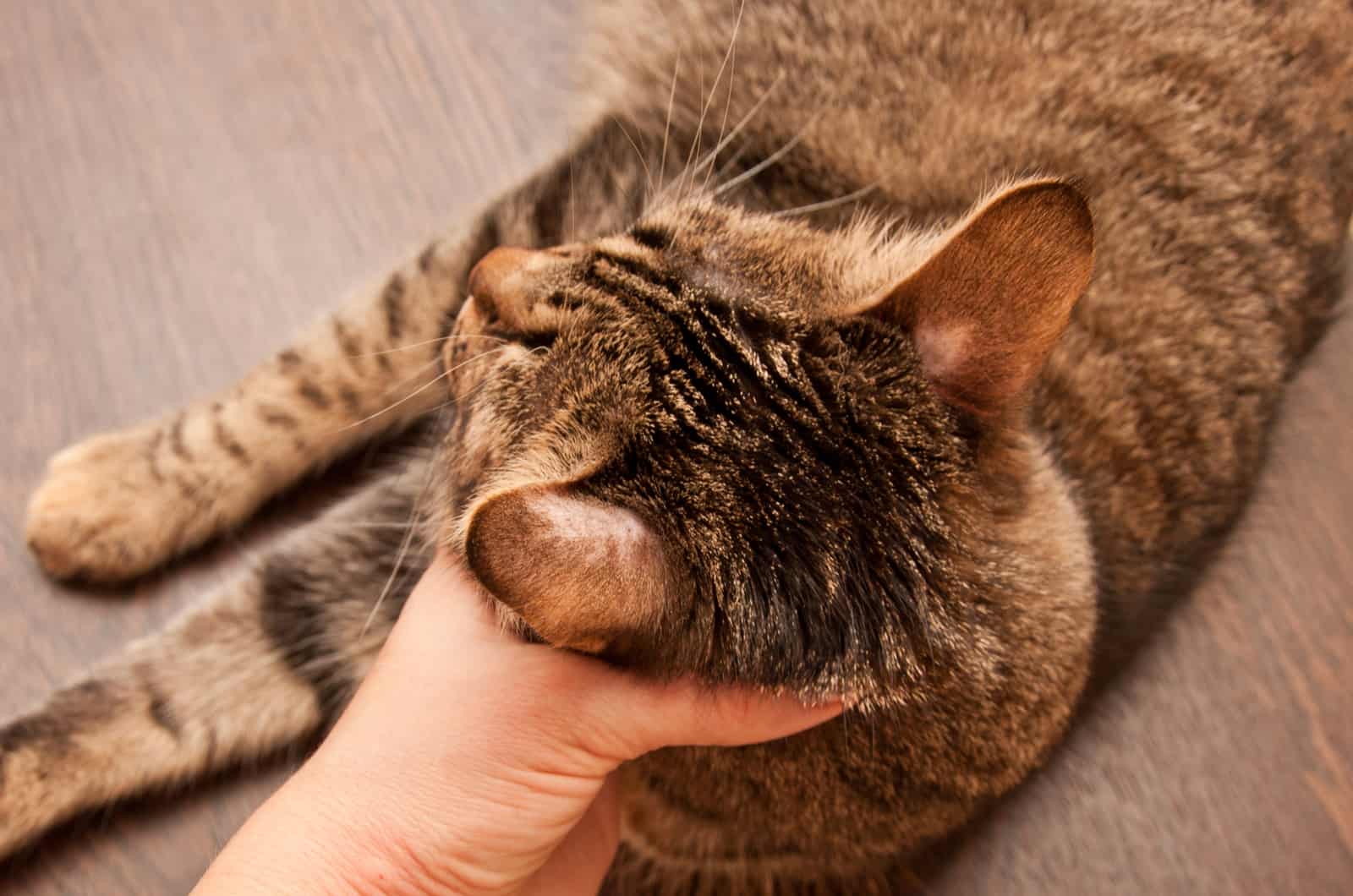
Cat hair loss on a cat’s ears is not something pet owners will be thrilled to see.
Hair loss in general is not something you ever want to notice in your cat, except if you already know you can expect it due to the cat’s breed and genetics.
There are numerous causes of hair loss on a cat’s ears. A few causes will be considered “normal” as they are genetic. For example, Siamese cats are prone to hair loss and so this is not a sign your Siamese cat is sick.
In most cases, hair loss is a symptom of an underlying infection or a disease that your cat is dealing with.
Loss of hair on the ears can be a sign of ringworm infection, mite infestation, an allergic reaction, hormonal imbalance, hyperthyroidism, flea infection, and other similar disorders.
Considering that some of these causes pose a serious threat to your cat’s health, keep on reading to find out more about the causes of cat hair loss on the ears, as well as what to do if you notice your cat losing hair.
Cat Hair Loss On Ears – Should You Be Worried?
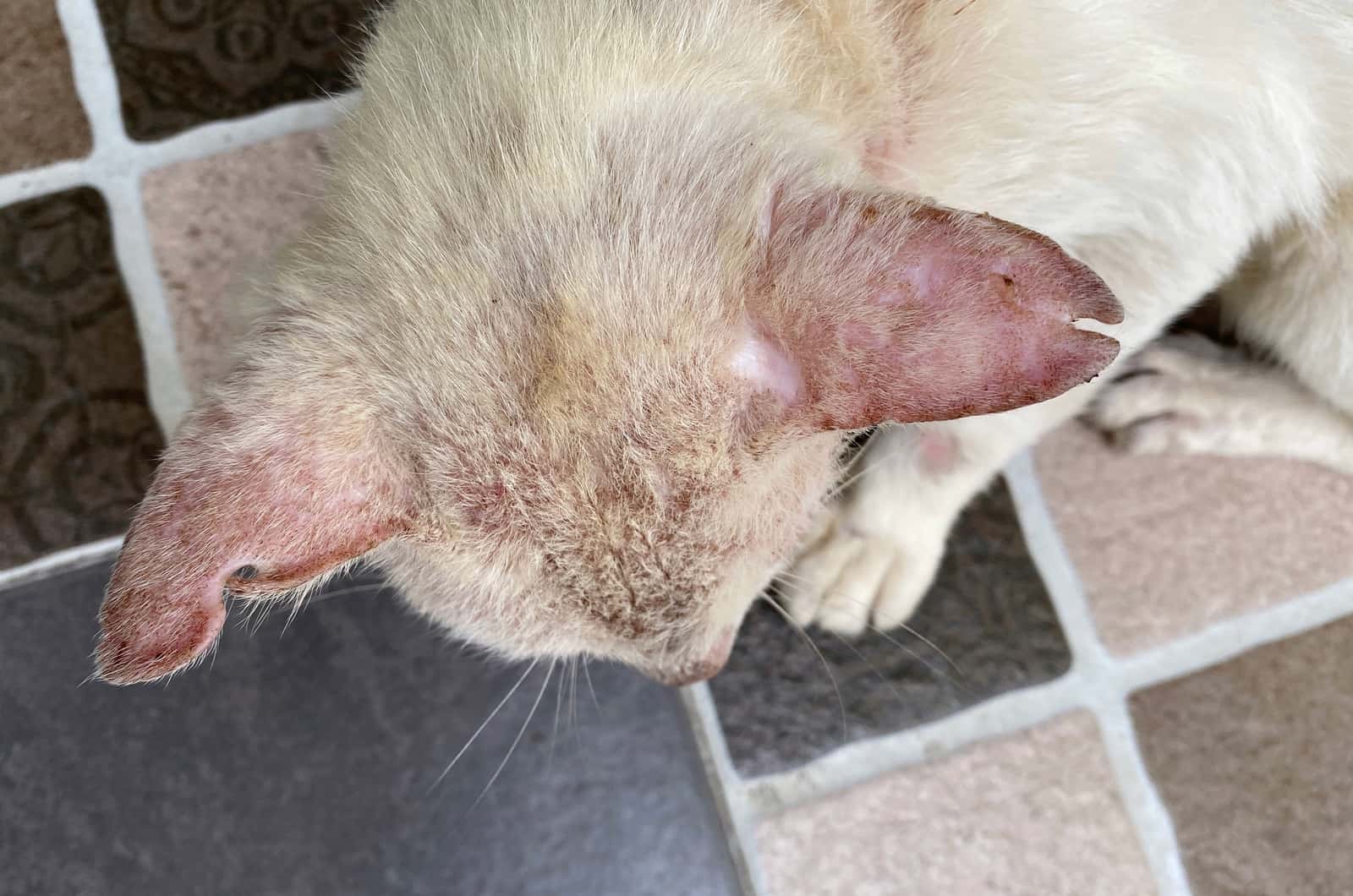
Cat hair loss on ears (or any other body part) is not something that should be taken lightly. In the majority of cases, there is an infection or a disease attacking your cat and hair loss is a symptom of it.
You should take your pet to the vet, but you should not be overly worried because there are many efficient treatments that will most likely help your cat.
The list of possible causes is not a small one, but the most common causes are also small; mites and fleas!
Affected cats do not usually suffer solely from hair loss, but also intense itchiness, skin redness, and sometimes sores and lesions. Therefore, a visit to the vet is highly recommended, especially if the symptoms are severe.
Cat Alopecia
Cat alopecia is the loss of hair in places where hair should be present. Bald patches can be a result of your cat’s excessive scratching, biting and licking.
On the other hand, there are cases where the hair falls out by itself, and not as a result of your cat’s actions.
In order to treat cat alopecia, first the cause of it must be found.
Cat alopecia can be:
• Hereditary
If a lack of hair or hair loss is “in the genes” then the hair follicles do not develop properly or stop developing properly, leading to localized baldness.
• Acquired
Acquired alopecia is when the cat’s fur is falling out, leading to bald spots due to intense scratching, biting, and excessive grooming. There is always an underlying cause of the itching, which needs to be identified.
This Is Why Your Cat Is Losing Hair On Its Ears!
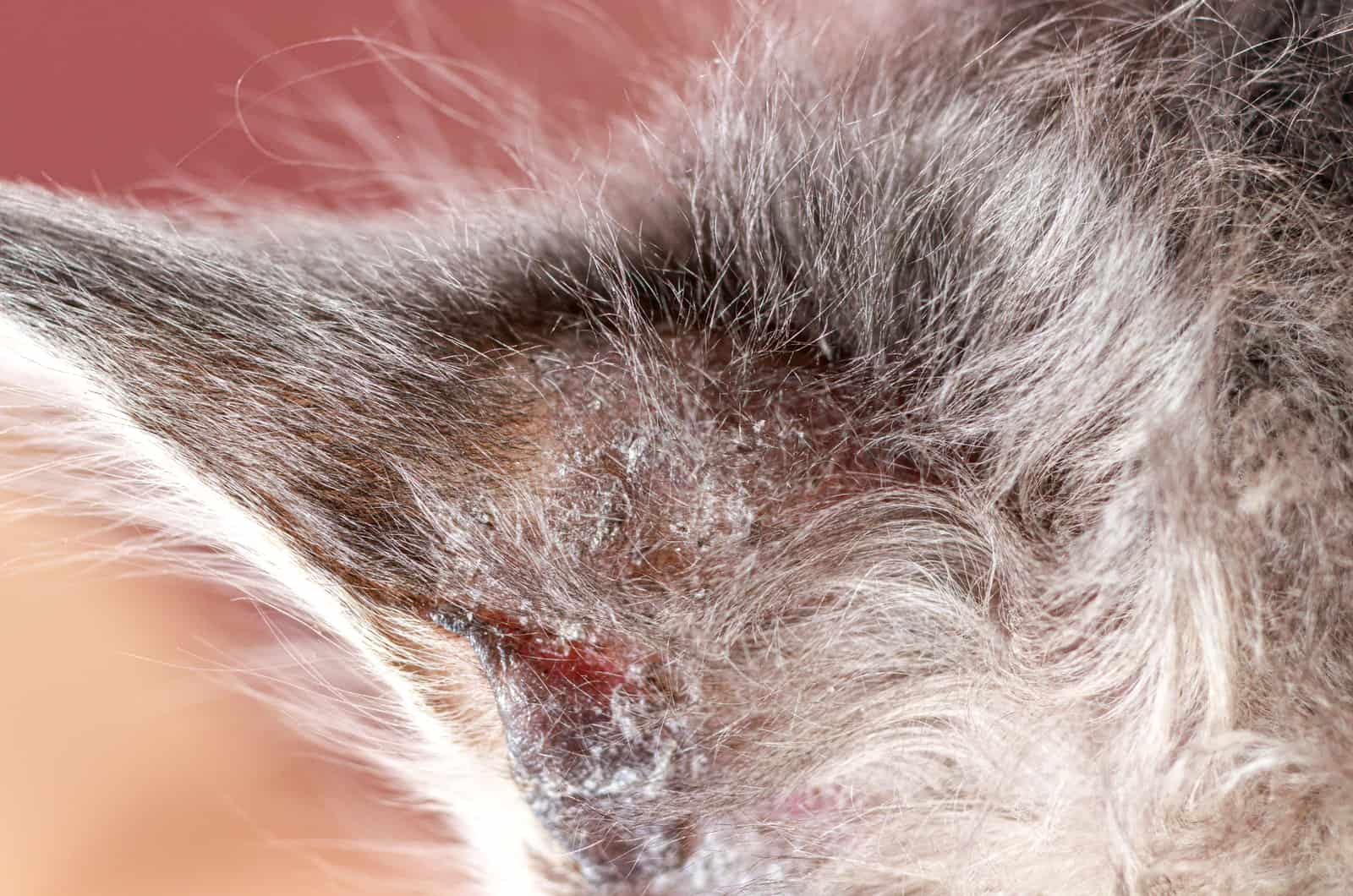
You might notice your cat’s ears lack fur because your cat is constantly scratching or something makes the hair fall out by itself.
There is no single reason why your cat might be losing hair on its ears only. As you’ll see, I have listed 4 possible causes of hair loss on the ears, and these may affect other parts of the body too.
1. It’s Due To Intense Scratching – 4 Main Causes
An irritation may cause your cat to scratch intensely.If your cat is scratching again and again, it means that there is something making your cat constantly itchy.
Of course, an occasional scratch here and there is normal, but you will know when the scratching is out of the ordinary.
Intense scratching, biting and licking leads to crusts and scabs forming at the sites of the itching, potentially forming bald patches.
This may happen on any part of the cat’s body, and the cat’s ears are no exception.
The most common causes of your cat scratching, causing hair loss on the ears are:
1. Allergies
The most common symptom of your cat being allergic to something is scratching. Your cat might scratch only one specific part of the body (such as its ears) or it may scratch all over.
Your cat could have an allergic reaction to:
a) Inhalants
The most common allergens your cat can breathe in are:
• Pollen
• Dust
• Mold
It should be noted that scratching is not always the most obvious symptom of an allergy.Sneezing, coughing, wheezing, and watery eyes are often stronger symptoms.
So if you think that cat hair loss on the ears is due to an allergic reaction to pollen, dust or mold, then monitor your cat for other additional symptoms.
b) Food
Cats can have a food allergy if they’re allergic to a specific protein within a food.
Itching is the most common symptom that may affect any part of the body, including the ears. These cats also tend to over groom themselves, causing sores and hair loss.
The most common food allergies are triggered by:
• Beef
• Dairy products
• Sea food
c) Insects
A cat might be allergic to the venom delivered by an insect or the saliva from an insect bite. Of course, not all cats are allergic to insect bites and stings, but some cats can have a really bad reaction to them.
Different cats will react with different severity to an allergen. For some, a single bite can cause a very severe allergic reaction, while others will have a mild reaction even with a few bites or stings. It really depends on the individual cat.
The most common allergic reactions with insects to blame are due to:
• Mosquito bite(s)
• Bee sting(s)
• Wasp sting(s)
• Ant bite(s)
• Spider bite(s)
• Flea bite(s)
A Section Dedicated Especially To Flea Bites In Cats
Your cat might be having an allergic reaction to a flea bite. A flea allergy is more common than you might think. Some believe this to be the most prevalent cat allergy.
A cat can have a severe immune reaction as a response to a flea bite. Just one flea bite can cause chaos to a cat’s system, let alone many of them.
The cat can be allergic to flea saliva, which contains substances the cat’s body identifies as foreign, therefore it tries to destroy them.
An allergic response can manifest as intense scratching and biting, leading to the loss of hair on those places and creating bald spots, as well as sores and scabs.
This is most frequently observed in the tail region, but the neck and head are also areas where scratching and damage may occur.
2. Bacterial Infection
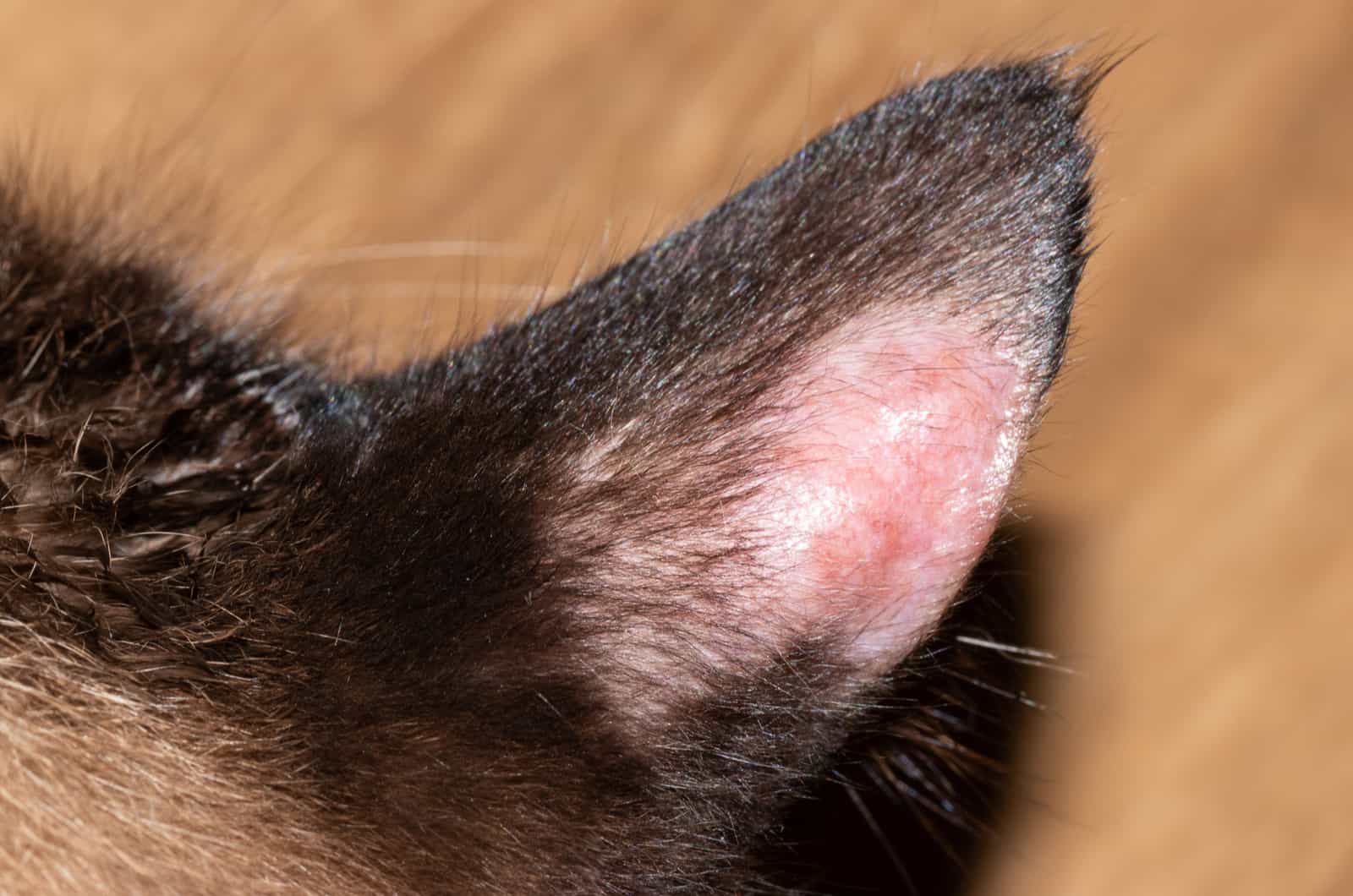
Bacteria can be the cause of your pet losing hair on its ears. It can be the primary cause, or a consequence of an underlying disease.
Bacteria that are known to cause cat alopecia are often from the Staphylococcus genus but there is not a lot of research into this topic.
Bacteria are not a frequent cause of cat hair loss on ears, but they are worth a mention.
3. Fungal Infection
Fungus is a group of microorganisms that includes yeasts, molds and mushrooms. Fungal infections can cause intense itching and this can lead to scabs, sores, lesions and, in turn, loss of hair.
a) Ringworm
A disclaimer: there are absolutely no worms here! It really is a misleading name for a skin infection caused by a fungus!
It is called a ringworm infection because it causes a rash on the skin that is ring-shaped.
The most commonly affected areas are the face, tail, feet and ears (ear tips, to be more precise).
Infected cats have bald patches that are scaly with possible sores and scabs. The fungus populates around the hair shaft, leading to the breakage of the hair strand itself. This leads to bald spots.
This infection is not something that should be taken lightly. It is pretty serious, but luckily, it’s also completely treatable!
b) Yeast Infection
A yeast infection is very rare in house cats, but it still can happen.
Blastomyces, Malassezia, and Candida are yeast species that are known to cause cat hair loss.
Common symptoms of a yeast infection are:
• Loss of hair
• Greasy skin and hair
• Scaly skin
• Thickening of the skin
• Skin lesions
4. Parasitic Infection
Parasites are organisms that live in or on the host, and oftentimes cause harm. Parasites can populate a cat’s ears, leading to itchiness and subsequent hair loss.
Parasitic infections are the first thing that comes to a lot of people’s minds when someone mentions cat hair loss, as they are pretty common.
a) Mite Infestation
Mites are extremely small bugs that are very hard to observe. Those of us who have dealt with them know the many problems they bring with them. They cause a lot of itching in both dogs and cats.
Ear mites live in the ear canal and cause a lot of itchiness in the ears.
Symptoms your cat might have as a result of mites include:
• shaking their head
• scratching their ears
• inflamed ears
Feline mange is a highly contagious (but rare) skin condition caused by a mite called Notoedres cati. It causes severe itching, skin damage, and hair loss. It is more common in dogs, but it can occur in cats as well.
Mite infestation should be taken seriously as it can lead to bacterial infections, swelling, and in the worst case scenario, deafness.
Bald spots are caused by inflammation of the skin and hair follicles. Topical ear drops are a common solution for mite infestation.
Tick Infestation
Pet owners, I know spring might not be your favorite season because of ticks (they are a type of mites)!
Your cat might pick up a tick in your garden and you will feel a small bump on your cat’s skin. They are mostly found near the head, neck, and ear area.
Signs of tick infestation are your pet shaking its head and rubbing it against surfaces, as well as scratching the ear.
b) Flea Infestation
Unfortunately, there is always a possibility of your cat becoming a host to fleas. They can be observed with the naked eye when combing your cat with a flea comb.
The biggest tell-tale sign your cat has fleas is constant itchiness and scratching.
When grooming, cats often eat the fleas that they discover, which can make it difficult to find adult fleas in the fur. An itchy cat, or insect bites on human ankles, may be the only sign of an infestation.
2. It’s A Sign Of An Underlying Disease – Which Diseases?
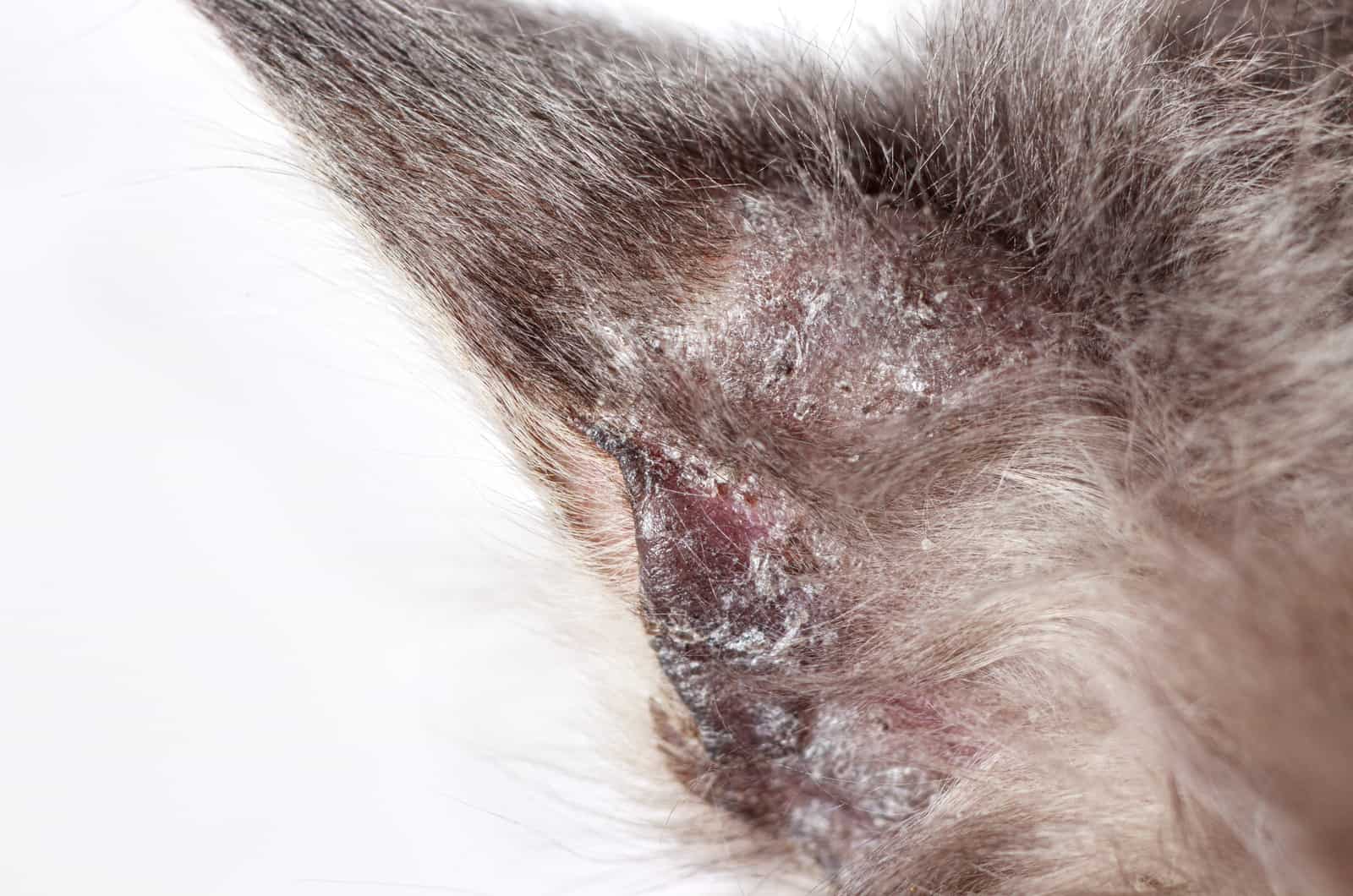
Your cat might be dealing with a disease that is not due to some organism living in or on the cat’s skin, such as a tick or the ringworm fungus.
There can be something going on inside your cat’s system, seemingly unrelated to hair loss on the ears.
Below are the most common diseases which may have cat hair loss on both the ears and other parts of the body as a symptom.
a) Hyperthyroidism
Hyperthyroidism is the result of thyroid glands overproducing the thyroid hormone. It is especially common in older cats. This hormonal imbalance especially affects the heart and causes an increased metabolic rate.
Common symptoms your cat cat might be displaying are:
• weight loss
• restlessness
• aggressiveness
• increased water intake and urination
• excessive meowing
• vomiting and diarrhea
• anorexia (in extreme cases)
These symptoms progress gradually, so they might not be easy to recognize at first.
b) Alopecia Areata
Alopecia areata is a rare disease that we don’t know a lot about. Some believe it to be an autoimmune disease, while others believe that the cause of the disease is the cat’s diet.
Traits of this disease are:
• loss of entire patches of hair
• hair loss more severe in the head, neck, and back area
• no itching
• goes away by itself in 2-3 weeks
c) Psychogenic Alopecia
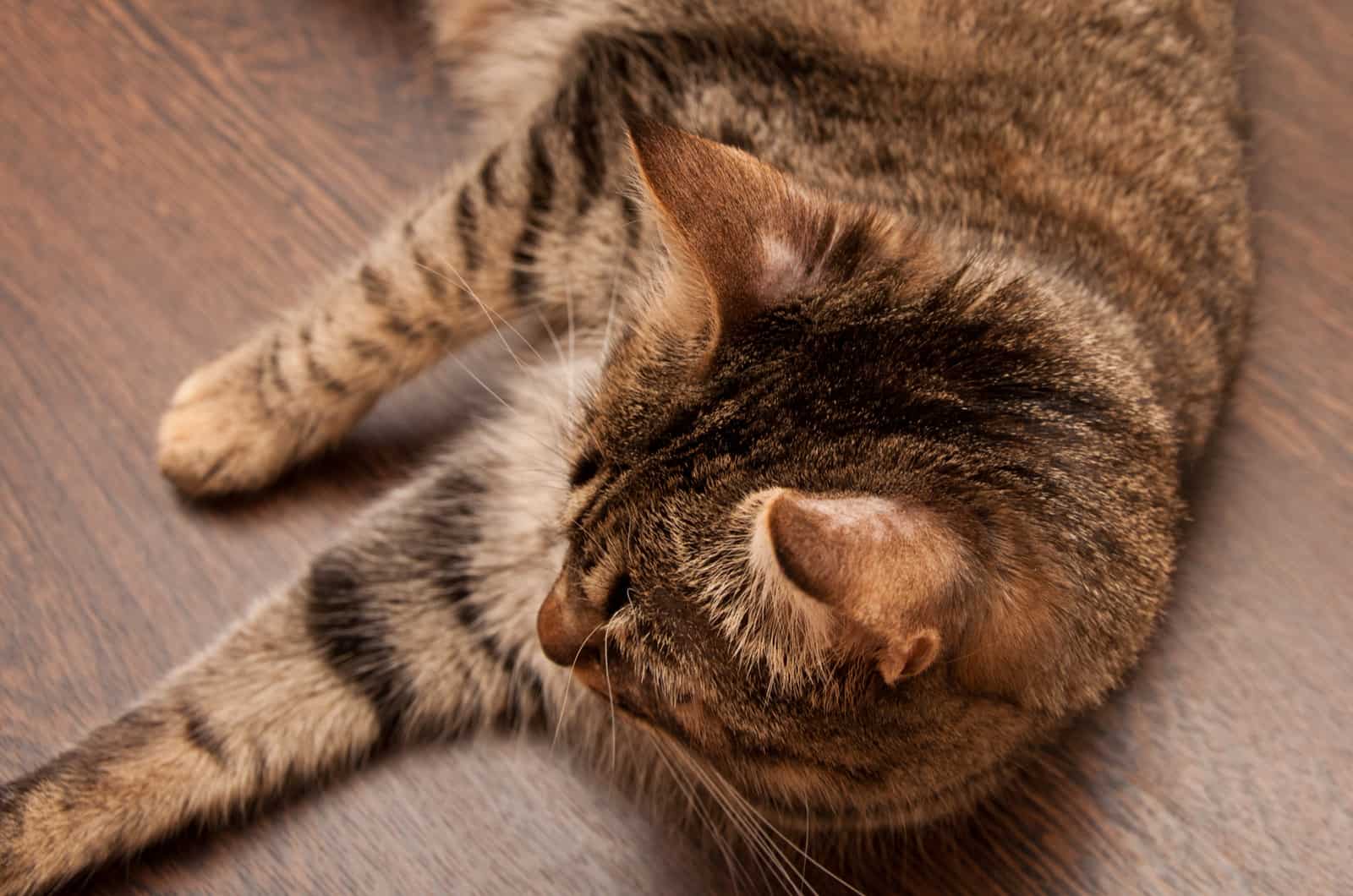
This condition is caused by your cat not feeling well mentally.
Overgrooming and licking is the major consequence of this condition. Excessive grooming leads to hair loss, as more hair is falling out than growing.
Things that make your cat anxious include changing environments and a new pet being around.
Some believe that this condition is overdiagnosed and other physical causes are the real reason for hair loss.
d) Dermatitis
Dermatitis is a skin condition characterized by skin inflammation or irritation. It results in intense itchiness, and your cat’s skin might appear as if it has a rash. As your cat scratches the irritated area, this leads to scab, lesion and bald patch formation.
The symptoms for this skin disease are:
• itching and scratching
• redness of the skin
• hair pulling and hair loss
• small bumps on the skin
Considering that all of these skin problems are very uncomfortable for your cat, it is important that you take it to the vet as it will not go away on its own.
f) Sebaceous Adenitis
Sebaceous adenitis is an inflammatory disease characterized by deterioration of the sebaceous glands.
The most prominent symptom of this disease is scaling of the skin, which is usually not accompanied by itchiness.
It is very rare in cats, so the possibility of your cat having this disorder is extremely low, but it is worth a mention.
3. It’s Just The Genes
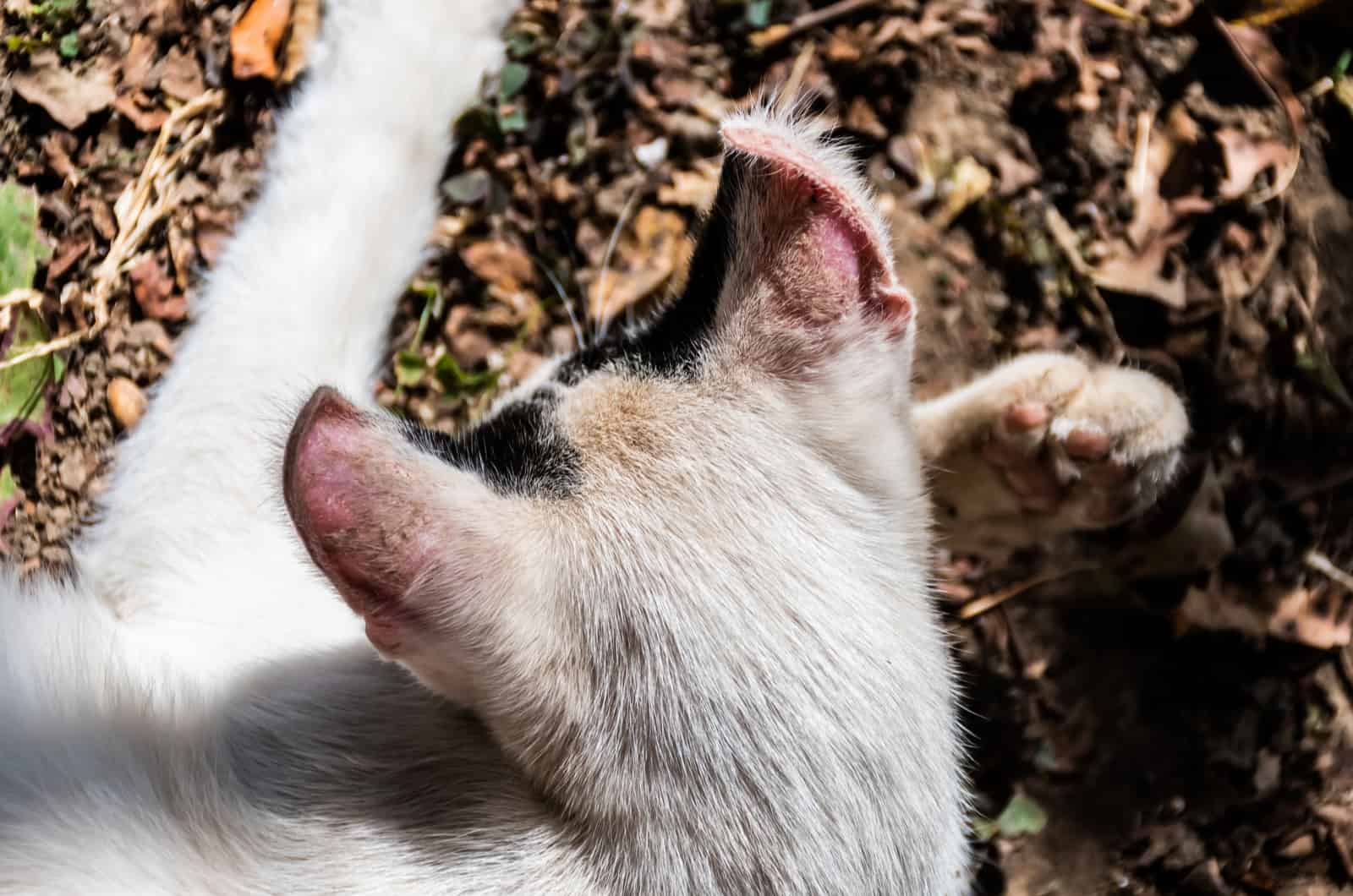
Some cats are more prone to hair loss than others. Some pure breeds are prone to it due to their genetics, such as:
• Siamese
• Himalayan
• Bengal
• Devon Rex
• Burmese
• Birman
Here, we are talking about hereditary alopecia, that (luckily) does not cause discomfort to cats and there is absolutely no itching and associated symptoms.
There is nothing your cat or you are doing that causes hair loss in this case, but your cat’s genes are to blame. Unfortunately this also means that there is nothing you can do to prevent it.
Considering this is a natural process, it’s normal, so don’t try to “fix it” in any way (creams, medication, changing shampoos, etc).
Is There Anything You Can Do About It?
In the case of hereditary hair loss, there is nothing you can do. It’s your cat’s genes and the hair is going to fall out, no matter what.
When it comes to acquired hair loss, not only is there something you can do, but you MUST do something about it! In this case, hair loss is treatable and possibly preventable in the first place!
This Is What I Advise You To Do!
Cat hair loss on the ears and other body parts is not something you should take lightly.
There are some things you can do by yourself in order to help your cat. For example, if you know for a fact your cat has fleas, you can buy treatment in the pet store.
If you do not know what is causing the hair loss, nor what to do about it – then visit the vet as soon as you can!
This is what you (or your vet) will need to do:
1. Identify The Source Of The Itching
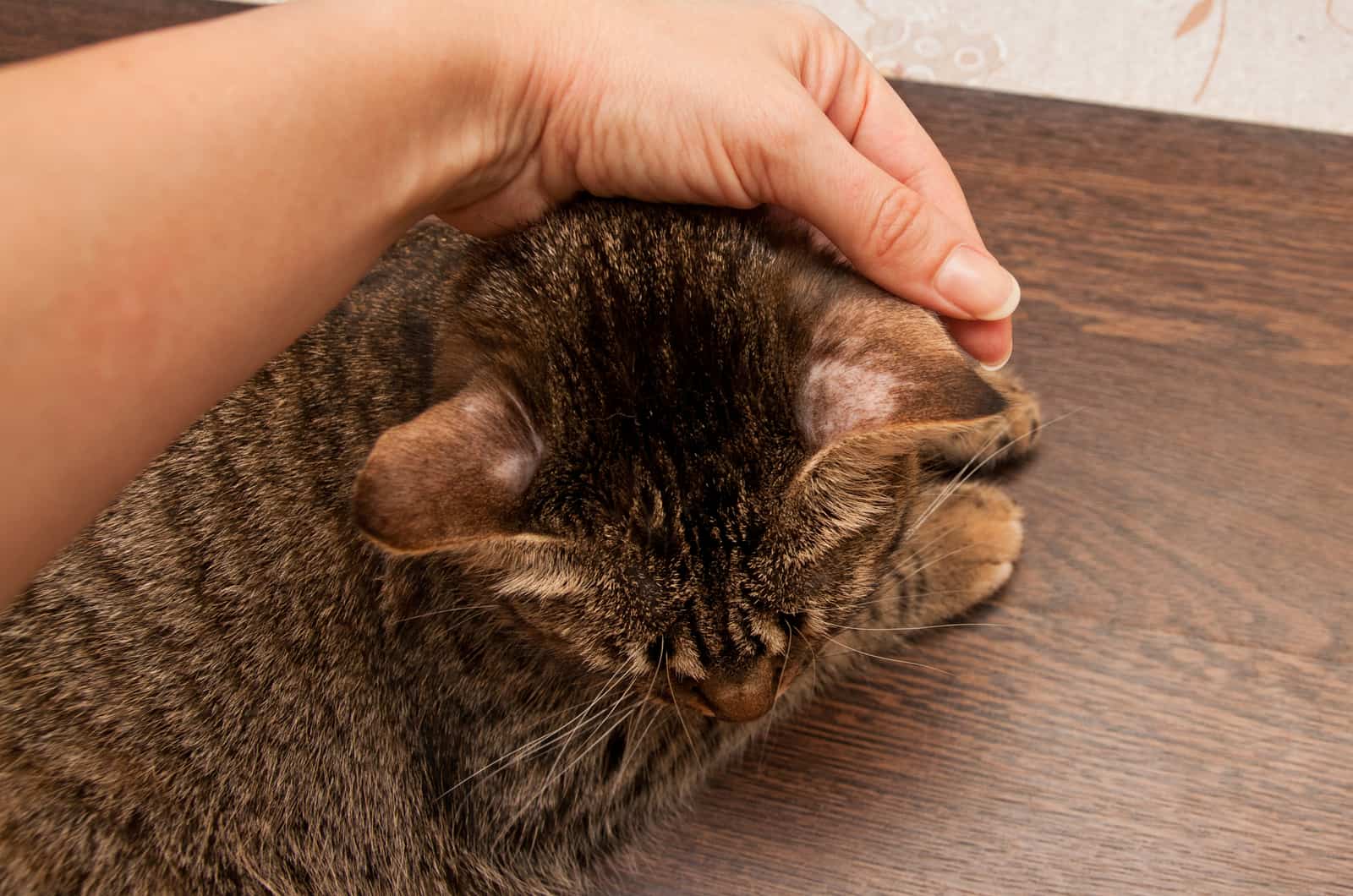
The source of the itching can be ringworms, yeast, mites, bacteria, fleas, pollen, food allergens, and others.
After you or your vet have found the source of the itching, it is going to be so much easier to get rid of!
How Is This Done?
• Allergy medication (such as antihistamines) in order to minimize any allergic reaction
• Antibiotics to treat any bacterial infection
• Antifungal medicines will get rid of any fungus (ringworms, yeast, etc.)
• Parasiticide treatment will get rid of any parasites (such as fleas and mites)
Most of these medications need to be prescribed by your vet. You should not use them outside of the vet’s guidance as they can be potentially dangerous if used incorrectly.
Also, your vet might recommend a collar to prevent your cat scratching and creating wounds or exacerbating the problem.
2. Find Out If Your Cat Has A Disease Causing The Hair Loss
As I mentioned, there are several diseases that might be causing your cat’s hair loss on ears, as well as other body parts. The possible diseases are hyperthyroidism, dermatitis, alopecia areata, psychogenic alopecia, and some others.
How Is This Done?
There is nothing you can do by yourself. Your vet is a professional who will know how to find out which disease is causing your cat’s hair loss.
I advise against googling diseases and their symptoms and providing a diagnosis yourself – leave it to the vet!
This Is What You Should Do To Prevent Acquired Cat Hair Loss!
If your cat is suffering from acquired hair loss, there are some steps you can take to prevent it from happening. This can save your cat (and you) from the discomfort of dealing with and treating these conditions.
3 Main Tips I Can Give You:
1. Keep Your Home Clean
If you know your cat is allergic to dust, make sure to clean your house more thoroughly than usual. That will keep allergen levels to a minimum. Your house should not have any mold anyway, but if it does, get rid of it.
2. Check Your Cat’s Fur Regularly
This is especially important advice for those whose cat spends a lot of time outside. In the yard, your cat might have “caught” some unwanted guests, such as mites or fleas.
By regular checking, you might catch the little trouble-makers early on!
3. Maintain Your Cat’s Health
Prevention is key! Make sure your cat has a healthy diet, sources of anxiety are kept to a minimum, and your cat is getting enough physical exercise.
Of course, some diseases cannot be prevented (such as hyperthyroidism or cancer), but others can!
Will The Hair Grow Back?
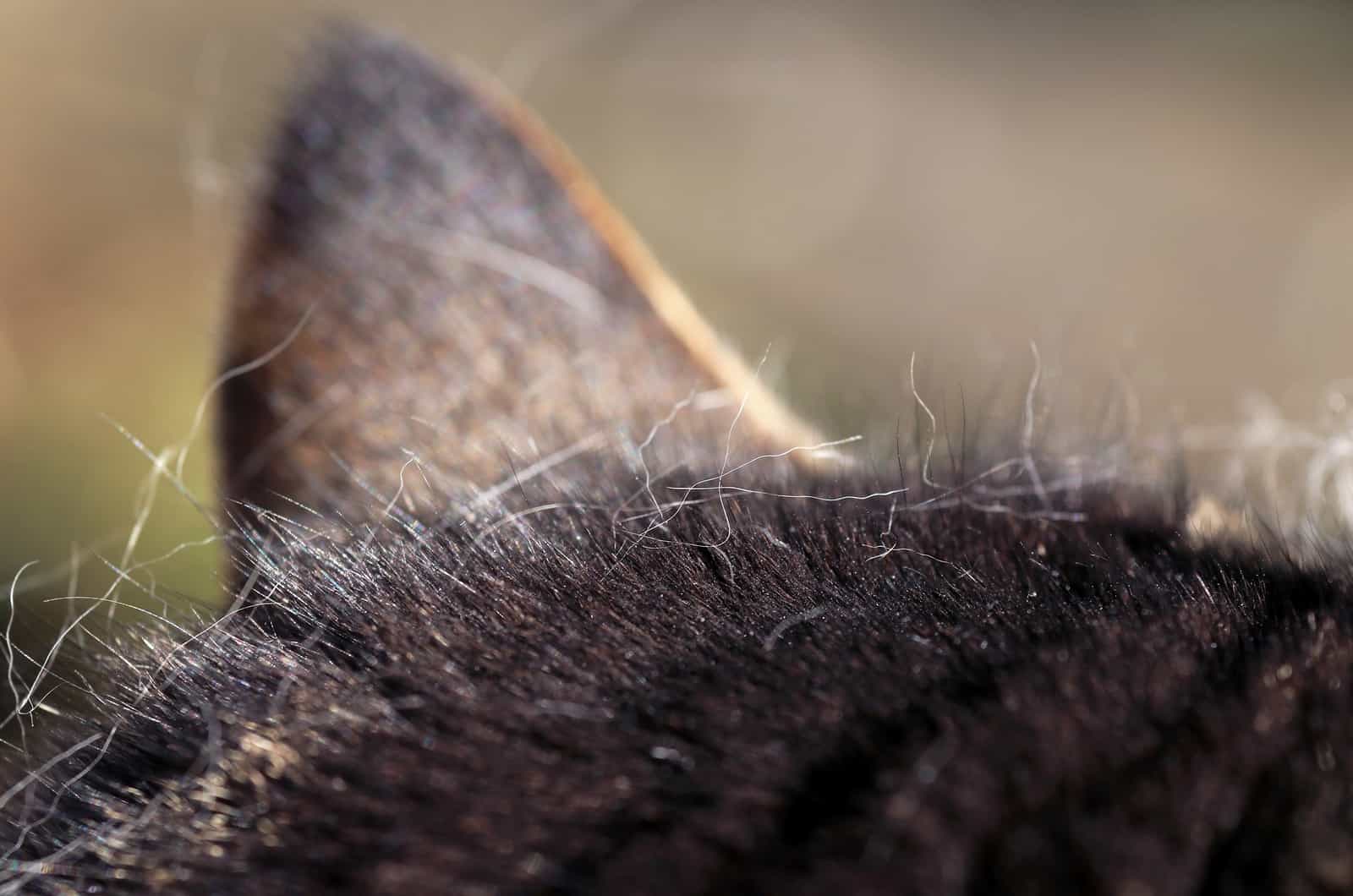
This is one of the main questions pet owners are interested in and I completely understand that. If your pet is suffering from hair loss, I am sure you’re wondering if the hair will soon start growing back.
If the reason your cat has lost its hair is NOT genetic, then yes – the hair will probably grow back with proper treatment!
The key is treating the infection or disease on time and with the right treatment or medication. The sooner and more efficiently you treat your pet, the sooner your pet’s fur will start growing back!
Frequently Asked Questions
What Is Cat Hair Loss On Ears?
This is a condition that can be hereditary or acquired. That means that the hair loss is something the cat or the owner has no control over, because the cat’s genes simply work that way. Some cats (mostly pure breeds) are more prone to bald patches (such as the Siamese cat).
On the other hand, this is something that can also be caused by mites, fleas, yeast, ringworm, and diseases such as hyperthyroidism, dermatitis, or hormonal imbalance.
For cats whose hair loss is caused by itching and subsequent scratching, the skin can get red, inflamed, flaky, or scabby, and there is a possibility of sores and lesions developing.
Affected cats absolutely need treatment and you, the pet owner, need to provide it for them!
What Condition Is The Cat Suffering From?
This is something that only your vet can tell you for sure.
Of course, there are instances where the pet owner alone will know what to do. Let’s say you notice your cat has fleas; there are ways to treat your cat without visiting the vet. For example, you can buy flea treatment in your local pet store,
In most cases, you will not know what is causing your pet to lose hair, so going to the vet and finding the exact cause is the best thing you can do.
What Is The Main Reason Cats Lose Hair On Their Ears?
The main reason cats lose hair on their ears is because they’re scratching them too much. This behavior is something you will definitely notice, as it is not normal or common. An occasional paw scratching the ear is okay, but doing it all day is definitely a sign something is wrong.
Itching is commonly caused by a bee sting, flea bite, ringworm infection, mites living in the ear canal, or fleas living in the cat’s fur.
Final Thoughts
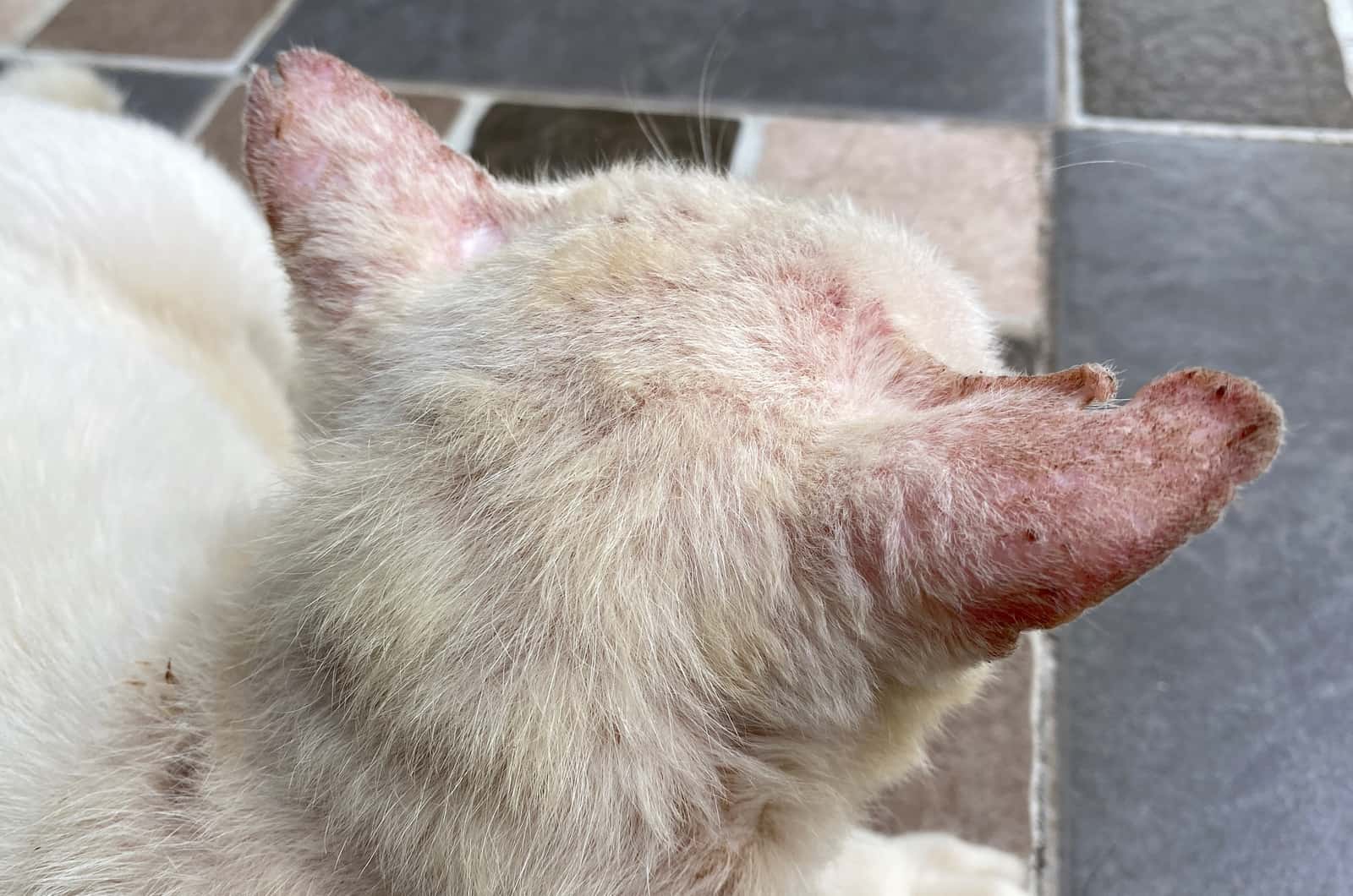
This article might have frightened you a little bit. I understand that completely – many of the infections and diseases listed sound absolutely terrible!
However, I have good news for you – most of them are unlikely causes of your cat’s hair loss on the ears. Considering our priority is the health of our cats, I had to list all the possible reasons your cat might be losing hair on its ears.
On the other hand, the most probable causes of cat hair loss on ears are mites, ringworms, and fleas. The ears are a common place for them to be found. This causes itchiness for your cat, which is solved only by scratching. Frequent scratching causes the skin of the ear to become irritated and red, and if the scratching is frequent, hair loss will be observed too.
Your cat losing hair on its ears is unlikely to be an issue that cannot be solved, but play it safe and go for a quick trip to the vet! Don’t worry, the vet will know exactly what to do. After a round of medication, your cat’s ear hair will hopefully start growing pretty quickly!




